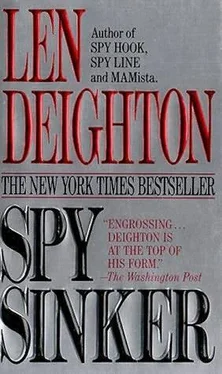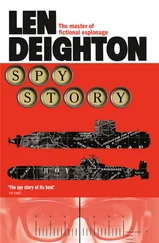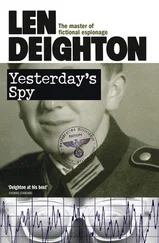Len Deighton - Spy Sinker
Здесь есть возможность читать онлайн «Len Deighton - Spy Sinker» — ознакомительный отрывок электронной книги совершенно бесплатно, а после прочтения отрывка купить полную версию. В некоторых случаях можно слушать аудио, скачать через торрент в формате fb2 и присутствует краткое содержание. Жанр: Триллер, на английском языке. Описание произведения, (предисловие) а так же отзывы посетителей доступны на портале библиотеки ЛибКат.
- Название:Spy Sinker
- Автор:
- Жанр:
- Год:неизвестен
- ISBN:нет данных
- Рейтинг книги:4 / 5. Голосов: 1
-
Избранное:Добавить в избранное
- Отзывы:
-
Ваша оценка:
- 80
- 1
- 2
- 3
- 4
- 5
Spy Sinker: краткое содержание, описание и аннотация
Предлагаем к чтению аннотацию, описание, краткое содержание или предисловие (зависит от того, что написал сам автор книги «Spy Sinker»). Если вы не нашли необходимую информацию о книге — напишите в комментариях, мы постараемся отыскать её.
Spy Sinker — читать онлайн ознакомительный отрывок
Ниже представлен текст книги, разбитый по страницам. Система сохранения места последней прочитанной страницы, позволяет с удобством читать онлайн бесплатно книгу «Spy Sinker», без необходимости каждый раз заново искать на чём Вы остановились. Поставьте закладку, и сможете в любой момент перейти на страницу, на которой закончили чтение.
Интервал:
Закладка:
'Hello, Franz,' said Fiona, uncertain of what was expected of her.
'Say, hello, Franz,' said Doktor Wieczorek, and added, 'He hears everything but perhaps today he doesn't want to talk to us.' He took the wheelchair and tipped it back to lift the front wheels clear over the step.
Wieczorek took Franz in his wheelchair along the corridor, continuing his small talk and seeming not to notice that Franz didn't answer. Fiona followed. When the chair was positioned in a small room with 'Treatment Room No. 2' on its door it was placed so that Fiona and the doctor could sit down and face the patient. Although he still hadn't moved his head Franz had become agitated at coming into the room. He was looking at a small grey enamel cabinet in the corner. Its dial was calibrated in volts and there was a mechanical timer and wires ending in what looked like headphones. Franz stared at the machine and then at Doktor Wieczorek and then back at the machine again.
'He doesn't like the electric shock treatment,' said the doctor. 'No one does.' He put out a hand and touched Franz in a reassuring gesture. 'It's all right, Franz. No treatment today, old friend. Coffee, just coffee.'
As if by prearrangement a woman in a blue overall came in carrying a tray with cups, saucers and a jug of coffee. The chinaware was thick and clumsy: the sort which didn't readily break if dropped. 'I'll change my mind, if I may?' said Fiona as the doctor began pouring the coffee.
'Good. Changing people's minds is our speciality here. Isn't that right, Franz?' Doktor Wieczorek chuckled.
Franz moved his eyes and stared at Fiona. It seemed as if he could hear and understand everything that was said. Looking into his face, she wondered if there was something faintly familiar about him, but then she dismissed the thought.
'Poor Franz Blum was a hard-working young third secretary working in the attaché's office in London. Then one day he had a complete breakdown. I suppose it was the strain of being without his family in a strange country for the first time. Some people find it very difficult to adapt. The Embassy shipped him back to Moscow as soon as it was realized that he was sick. Everything was tried and although there were times when he seemed to get better, in the long term he just got worse and worse. It's a sad case. In a way he provides us with a constant reminder of the limitations of our science.'
Fiona watched Blum as he reached for his coffee, extending two hands and picking it up with very great care.
'One confidential KGB report from London said that Franz was a spy for the British,' said Doktor Wieczorek. 'But apparently there is no hard evidence to support the allegation. There was never any question of him going on trial but we were told the background, in case it could help in diagnosis. There was an inquiry, but even your Stasi interrogators got nothing out of him.'
She kept calm, very calm, but she turned her eyes away from Franz. 'But you did?' Then this was the man she had reported to Martin Pryce-Hughes, the one she had betrayed and consigned to a living death. Was Doktor Wieczorek in on that whole story, or was it all just need-to-know?
'We have that sort of patient sometimes. Franz wasn't easy to deal with. It's a long time ago now but I remember it all so clearly. When he didn't respond to the pills and injections it became clear that electric shock would be the only way to help him. Not just the little sessions that are given to help depressed patients; we tried a new idea, really massive shocks.'
Franz spilled a dribble of coffee down his chin. Wieczorek took a handkerchief and wiped it. Then he gently removed Franz's woollen hat and indicated for Fiona the shaved patches where the electrodes were applied.
'Shock,' said Franz suddenly and loudly as the doctor fingered the bare skin.
'Good,' said Doktor Wieczorek proudly. 'Did you hear that? As clear as anything. Keep up the good work, Franz, and we'll soon be sending you home.' He replaced the knitted hat on the man's head but it remained askew, giving Franz Blum an inappropriately jaunty air. As if the demonstration was over, Doktor Wieczorek stood up and grabbed the wheelchair. He pushed it back into the corridor, where a nurse was waiting to take it from him. 'You didn't have your coffee,' Wieczorek said to Fiona as if suddenly remembering it.
'Is there much more of the clinic to see?' she asked.
'Nothing of consequence. Sit down and drink the coffee. I hope Franz didn't upset you.'
'Of course not,' said Fiona.
'He'll never go home, he'll never go anywhere,' said Doktor Wieczorek. 'He's institutionalized for life, I'm afraid. Poor Franz.'
'Yes, poor Franz,' said Fiona. 'But if the KGB report was true, he was an enemy of the State, wasn't he?'
'An enemy of the people,' Wieczorek corrected her sardonically. 'That's far worse.'
She looked at him: he was smiling. She knew then beyond any doubt that this was a charade, a charade acted out for her to guess the word. The word was 'treachery', and the pathetic zombie they had made of Franz Blum was an example of what would be done to her if she should betray her KGB masters. Is that why he'd quoted Carl Jung: 'Show me a sane man and I will cure him for you'?
'It's good coffee, isn't it?' said Doktor Wieczorek. 'I have a special source.'
'You're lucky,' said Fiona. Perhaps this terrifying warning was a procedure that all senior Stasi staff were subjected to. There was no way to be sure; that was how the country was run. Stick and carrot: award in the morning and warning in the afternoon. This topsyturvy clinic where the 'sane' were cured was just how she saw this 'workers' state' where the leaders lived in ostentatious grandeur in fenced compounds paced by armed guards.
'Yes, I am lucky,' said Doktor Wieczorek, savouring his coffee. 'You're lucky too: we all are.'
18
London. November 1983.
Bret Rensselaer was overplaying his hand. In trying to make Fiona Samson secure he'd even thrown suspicion on to Bernard Samson, suggesting that he might have been an accomplice to his wife's treachery. It was an effective device, for the Department was just as vulnerable to rumours, and whispered half-truths, as any other organized assembly of competitive humans. The trouble came because opinions were divided about Bernard Samson's integrity, and so a rumour started that another 'mole' was at work within the Department. An unhealthy atmosphere of mistrust and suspicion was developing.
The discovery of the murdered Julian MacKenzie in a Department safe house in Bosham gave further impetus to the gossip. Thanks to what Miranda Keller had told him, Bret knew that it was a case of mistaken identity: the KGB had been after Bernard Samson. But Bret took no action in the matter before getting Samson into the number 3 conference room and admonishing him in the presence of suitable witnesses. Samson shouted back, as Bret knew he would, and Bret ended up by telling everyone who would listen that Bernard Samson was 'beyond suspicion'.
But spinning the web of deceit that he deemed necessary for Fiona's safety was taking its toll of Bret Rensselaer. He was by nature an administrator: brutal sometimes, but sustained always by self-righteousness. Running the Economics Intelligence Section had been a task for which he was ideally fitted. But Sinker was different. His original plan to target the East German economy by draining away skilled workers and professional people was not as easy as it once seemed. Fiona had supplied him with regular information about the East German opposition and other reform groups but they could not unite. His overall problem was that keeping Sinker such a close secret meant telling ever more complex lies to his friends and colleagues. It was vital that none of them could see the whole plan. This was demanding in a way he did not relish. It was like playing tennis against himself: criss-crossing the centre line, leaping the net, wrong-footing himself and delivering ever more strenuous volleys that would be impossible to return.
Читать дальшеИнтервал:
Закладка:
Похожие книги на «Spy Sinker»
Представляем Вашему вниманию похожие книги на «Spy Sinker» списком для выбора. Мы отобрали схожую по названию и смыслу литературу в надежде предоставить читателям больше вариантов отыскать новые, интересные, ещё непрочитанные произведения.
Обсуждение, отзывы о книге «Spy Sinker» и просто собственные мнения читателей. Оставьте ваши комментарии, напишите, что Вы думаете о произведении, его смысле или главных героях. Укажите что конкретно понравилось, а что нет, и почему Вы так считаете.












